voc-, voca-, vocab-, vocat-, -vocation, -vocative, -vocable, vok-, -voke
(Latin: call, talk, speak, say, voice; word)
Someone who has a cultivated or trained voice; a singer: Many musical performances include successful vocalists who sing modern renditions of songs or in operas.
1. The use of uttered sounds for auditory communication: Cats are very good in communicating with their owners with vocalizations; especially, when they are hungry!
2. The sound made by the vibration of vocal folds modified by the resonance of the vocal tract: The bass, tenor, alto, and soprano are all good examples of vocalization and are very important sections in a chorus.
3. That which is voiced rather than voiceless: The vocalizations of letters exist when they are read out loud; otherwise, reading them silently does not produce any sounds.
2. The sound made by the vibration of vocal folds modified by the resonance of the vocal tract: The bass, tenor, alto, and soprano are all good examples of vocalization and are very important sections in a chorus.
3. That which is voiced rather than voiceless: The vocalizations of letters exist when they are read out loud; otherwise, reading them silently does not produce any sounds.
vocalize (verb), vocalizes; vocalized; vocalizing
1. To utter, to say, to pronounce, or to sing: Not only did the chairman present written minutes regarding the last meeting, but he also vocalized by verbally commenting about them at the next meeting.
2. To provide a voice for; to render articulate: Birds have to vocalize in order to communicate with each other.
3. To produce sounds with the voice, as in speaking or singing: Susan vocalized the poem for her audience as a song at the recital and the audience was enthralled with her interpretation of it.
2. To provide a voice for; to render articulate: Birds have to vocalize in order to communicate with each other.
3. To produce sounds with the voice, as in speaking or singing: Susan vocalized the poem for her audience as a song at the recital and the audience was enthralled with her interpretation of it.
vocally (adverb), more vocally, most vocally
Pertaining to how someone expresses opinions or feelings freely or loudly with his or her voice: Jack found it was quite difficult to vocalize his true feelings for his girlfriend, but he certainly did show his affection through his behavior in treating her so respectfully and lovingly.
1. An occupation that is often referred to as a "calling", because it is "a call to follow a way of life": The notion that a disembodied "voice" is calling people to their purpose on earth is the basis for the word vocation.
2. A call to, or fitness for, a certain career; especially, a religious position: Susan decided to become a nun and to serve in the church as her vocation because she felt deep down inside that God wanted her to serve Him, so she went to a convent to live and work.
3. The work or profession for which one has a sense of special fitness: Thomas was very good at writing essays in school in foreign languages and so he loved to travel and he thought that his vocation would be that of a foreign correspondent for television or for a news agency.
4. A strong feeling of suitability for a particular career or occupation: Lisa loved playing piano and was quite successful playing in recitals as a student, and she and her teachers felt that she had the talent, competency and endurance to choose the vocation of being a professional pianist.
5. Etymology: borrowed from Middle French, or directly from Latin vocation-, vocatio-, "a call" or "a summons"; from Latin vocare, "to call", and is related to voc-, vox, "voice".
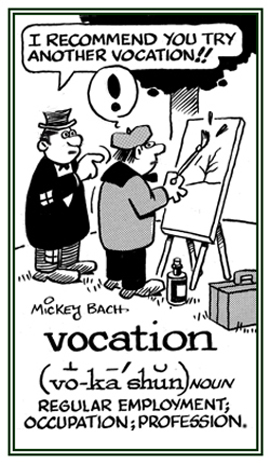
© ALL rights are reserved.
Go to this Word A Day Revisited Index
2. A call to, or fitness for, a certain career; especially, a religious position: Susan decided to become a nun and to serve in the church as her vocation because she felt deep down inside that God wanted her to serve Him, so she went to a convent to live and work.
3. The work or profession for which one has a sense of special fitness: Thomas was very good at writing essays in school in foreign languages and so he loved to travel and he thought that his vocation would be that of a foreign correspondent for television or for a news agency.
4. A strong feeling of suitability for a particular career or occupation: Lisa loved playing piano and was quite successful playing in recitals as a student, and she and her teachers felt that she had the talent, competency and endurance to choose the vocation of being a professional pianist.
5. Etymology: borrowed from Middle French, or directly from Latin vocation-, vocatio-, "a call" or "a summons"; from Latin vocare, "to call", and is related to voc-, vox, "voice".
The original meaning of vocation in 1426 was "a call from God to follow a spiritual way of life", as in "the priestly vocation or "the vocation of a nun".
The sense of one's ordinary occupation, or profession, is first recorded in English in 1553; perhaps influenced by that meaning which existed in Middle French.

Go to this Word A Day Revisited Index
so you can see more of Mickey Bach's cartoons.
vocational (adjective), more vocational, most vocational
Relating to an education that is designed to provide the necessary skills for a specific job or career: Sally decided to go to a vocational school after finishing high school so she could learn to become a nurse.
vocationally (adverb), more vocationally, most vocationally
Concerning how well and skilled a person is trained for a certain career or job: With all the experience Tom had in repairing cars, he certainly was vocationally suited for opening up his own auto repair shop to service vehicles.
vocative (adjective), more vocative, most vocative
A reference to or conveying the act of calling someone by name: Brutus is the vocative term being used in this Latin example of Et tu, Brute?
vociferant (adjective), more vociferant, most vociferant
A reference to clamorous noises or the utterances of loud cries: The marching band created the most vociferate noise the town had ever heard and it was accompanied by the shouts and cheers of the townspeople.
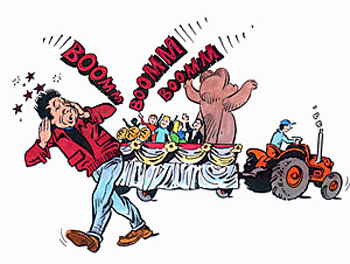

vociferate (verb), vociferates; vociferated; vociferating
1. To cry out noisily; to shout; to howl: The hungry calves in the barnyard vociferated as they were calling anxiously for their mothers.
2. To yell, to complain, or to strongly proclaim: At the campus rally for better food in the cafeteria, the student leaders, Richard and Henry, vociferated their concerns.
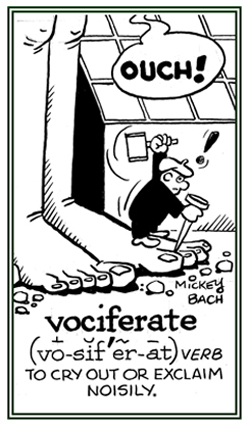
© ALL rights are reserved.
Go to this Word A Day Revisited Index
2. To yell, to complain, or to strongly proclaim: At the campus rally for better food in the cafeteria, the student leaders, Richard and Henry, vociferated their concerns.

Go to this Word A Day Revisited Index
so you can see more of Mickey Bach's cartoons.
Excessive howling or yelling; especially, in protest of something or someone: The police presence at the demonstration was to keep the vociferations of the protesters, including Buddy and Timmy, under control.
vociferous (adjective), more vociferous, most vociferous
1. Pertaining to noisy and loud shouting: When the salesclerk at the department store refused to give the vociferous customer a refund for a defected watch, the manager settled the conflict by replacing it with a new one.
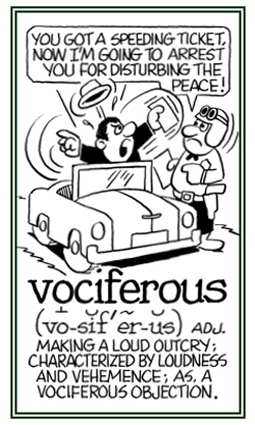
© ALL rights are reserved.
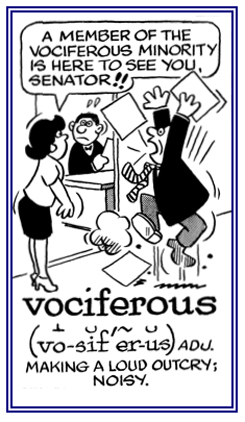
© ALL rights are reserved.
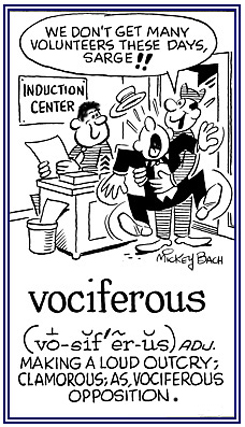
© ALL rights are reserved.
Go to this Word A Day Revisited Index
The citizens have been making vociferous demands that something be done to speed up the repair of the damaged bridge that connects two cities across the river from each other.
2. A special reference to a speech which is uproarious and rowdy: The mayor's vociferous opposition to increasing taxes during his debate on TV has resulted in his being re-elected for another term in office.


Go to this Word A Day Revisited Index
so you can see more of Mickey Bach's cartoons.
A vehement and furious outcry: An extreme vociferousness rose from the crowd as the unpopular politician tried to speak.
1. The sound produced by the speech or vocal organs and uttered by the mouth: Kate's baby boy suddenly woke up and started to cry, but he stopped crying as soon as he heard his mother's voice.
2. The musical tones produced in singing: Susan rather liked listening to the soprano and alto voices and thought she might join the choir after having some lessons in developing her voice for better performances.
3. The ability to produce audible words for speaking or for singing: When Harry had laryngitis, he lost his voice and could only whisper.
4. The right to express one's ideas or concerns: In a democracy, everyone can have a voice in expressing his or her feelings regarding government policies. 5. Etymology: "sound made by the human mouth", from Old French voiz, from Latin vocem, vox, "voice, word, language, sound, cry, call, sentence, speech, utterance"; related to Latin vocare "to call".
2. The musical tones produced in singing: Susan rather liked listening to the soprano and alto voices and thought she might join the choir after having some lessons in developing her voice for better performances.
3. The ability to produce audible words for speaking or for singing: When Harry had laryngitis, he lost his voice and could only whisper.
4. The right to express one's ideas or concerns: In a democracy, everyone can have a voice in expressing his or her feelings regarding government policies. 5. Etymology: "sound made by the human mouth", from Old French voiz, from Latin vocem, vox, "voice, word, language, sound, cry, call, sentence, speech, utterance"; related to Latin vocare "to call".
voiced (adjective), more voiced, most voiced
Relating to a medium of communication, or expression, which is spoken as a point of view: There are some voiced consonants in the alphabet, such as “b”, “g”, “z”, and “m”.
Carol is the most voiced person when it comes to defending women’s rights in society.
Cross references of word families related directly, or indirectly, to: "talk, speak, speech; words, language; tongue, etc.":
cit-;
clam-;
dic-;
fa-;
-farious;
glosso-;
glotto-;
lalo-;
linguo-;
locu-;
logo-;
loqu-;
mythico-;
-ology;
ora-;
-phasia;
-phemia;
phon-;
phras-;
Quotes: Language,Part 1;
Quotes: Language, Part 2;
Quotes: Language, Part 3;
serm-;
tongue.


